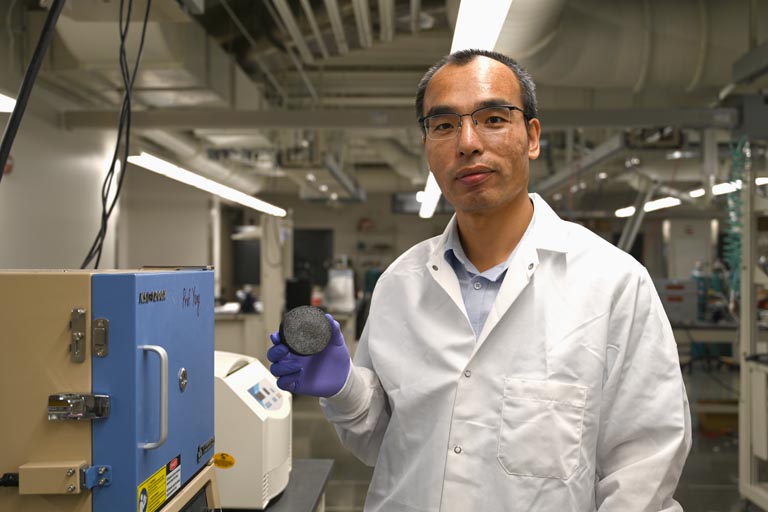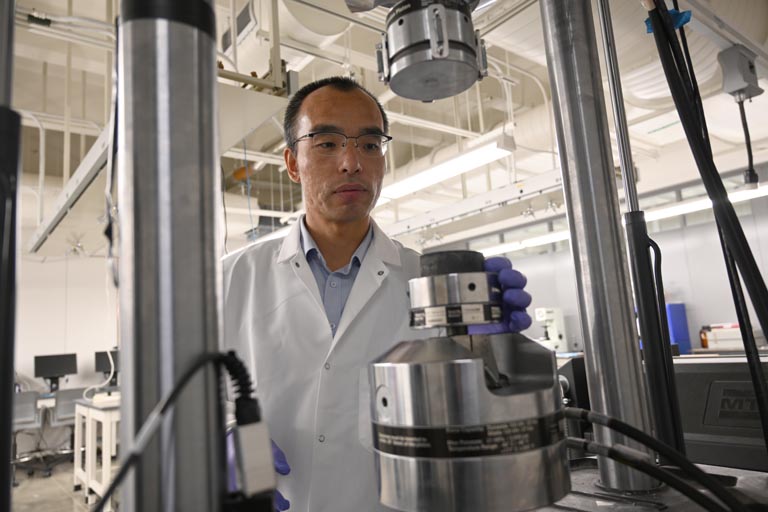October 07, 2024
Mizzou Engineer Yingchao Yang and collaborators are developing a new biochar-based foam to reduce the use of harmful chemicals in controlling fires.

Mizzou researchers are using innovative materials to solve old problems using new methods. Yingchao Yang, an associate professor of mechanical engineering, is using biochar, a form of plant waste, to support long-term forest management and prevent out-of-control wildfires.
Biochar is created by burning organic material, such as wood or plants, in an environment without oxygen. Because biochar is carbon-rich, it has numerous environmental uses, including both as a fertilizer and a composting medium. It also has the potential to mitigate climate change by acting as a carbon sink, locking CO2 into soil instead of the atmosphere. And it can be used agriculturally to improve water retention and reduce soil erosion.
Now, Yang is looking to add controlling the spread of fires to this list, with research supported by the United States Department of Agriculture Forest Products Laboratory (USDA FPL).
Into the fire
Before starting this project, Yang researched alternative uses for wood residues, biowaste and their carbon products, including biochar. He began coupling these products with nanomaterials, and in the last few years has published a series of papers focused on using this pair of materials for water treatment and energy storage.
Now, he’s turned his attention slightly from optimizing water and energy to controlling the notoriously uncontrollable: fire.
“This research is crucial because it aims to unlock the full potential of biochar as an eco-friendly and fire-resistant material for construction, particularly in the wildland-urban interface,” he said. “This innovation will enhance building safety and sustainability, as well as the long-term management of our National Forest System and other forest lands.”

The goal is to convert wood, biowaste and other agricultural residues into a biochar foam that will be used as the cores of structural insulated panels (SIPs). These panels are often used in building construction due to their strength and energy efficiency.
The recent rise in forest fires has increased the demand for fire-resistant housing in areas prone to drought near national forests. Traditional SIPs often contain chemicals, which can be released into the environment in the event of a disaster. Yang says that his proposed biochar foam panels supply a safe and eco-friendly alternative.
Preventing harm through meaningful impact
Housing isn’t the only application of Yang’s research. In their proposal, Yang and his collaborators at the National Forest System outlined a number of ways to reduce harm using biochar.
“We will be conducting multiple aspects of this research at Mizzou,” Yang said. “In addition to utilizing biochar foams as the lightweight fireproof core materials for SIPs, we also plan to evaluate its mechanical properties and stability under various extreme conditions and optimize the large volume manufacturing processes to improve product performance.”
Other aspects of this research project include acoustic absorption—testing how soundproof the biochar foam is—and ballistic testing.
Yang hopes this partnership with the Forest System not only drives innovations in forest management practices, environmental conservation efforts and safety, but also helps position Mizzou as a leading institution in critical research.
“I’m genuinely excited about this work because it perfectly aligns with my passion for applying materials science to address critical environmental challenges,” Yang said. “The opportunity to use my expertise to transform biowastes into valuable materials, contribute to sustainable energy solutions, and advance carbon reduction efforts is incredibly motivating. I’m eager to contribute to innovations that have a meaningful impact on our world.”
Engineer a better world by creating new sustainable materials. Choose Mizzou Engineering!